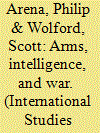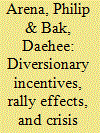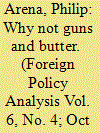|
|
|
Sort Order |
|
|
|
Items / Page
|
|
|
|
|
|
|
| Srl | Item |
| 1 |
ID:
117525


|
|
|
|
|
| Publication |
2012.
|
| Summary/Abstract |
How do states respond to uncertainty over their opponents' military strength? We analyze a model of crisis bargaining in which, prior to negotiation, an uninformed state chooses how to allocate scarce resources across armaments and intelligence gathering. Arming improves military capabilities, while intelligence gathering improves estimates of the other state's military capabilities. Our model thus allows both the distribution of power and the level of uncertainty in the crisis to be determined endogenously. We derive some notable results. First, the relationship between information revelation and war is conditional on beliefs held before the information is received, as more accurate information can reduce the probability of war for optimistic states but increase it for pessimistic ones. Second, the allocations that minimize the probability of war are often not those made in equilibrium. Finally, considering the interdependence between the two allocations yields unique insights into the relationship between the distribution of capabilities, uncertainty, and the risk of war.
|
|
|
|
|
|
|
|
|
|
|
|
|
|
|
|
| 2 |
ID:
137719


|
|
|
|
|
| Summary/Abstract |
We do not yet have strong evidence that the rally effect motivates domestically vulnerable leaders to become engaged in international conflict. We draw upon mechanism design to argue that, if anything, diversionary incentives should be associated with a greater likelihood of being the target of disputes, though the conditions under which the result obtains are restrictive. Our analysis of all dyad-months involving the United States and its rivals for the period from 1956–1996 yields suggestive evidence of the unconventional behavior anticipated by our model, while failing to find evidence of patterns anticipated by either traditional diversionary accounts or strategic conflict avoidance. These results suggest that if we are to better understand international conflict by focusing on diversionary incentives, which may not be very useful, we should focus on the behavior described by our formal model rather than that anticipated by either traditional diversionary accounts or strategic conflict avoidance.
|
|
|
|
|
|
|
|
|
|
|
|
|
|
|
|
| 3 |
ID:
092337


|
|
|
|
|
| Publication |
2009.
|
| Summary/Abstract |
Consideration of the effects of domestic politics on international conflict behavior often consists simply of contrasting democracies with non-democracies. One notable exception is work that links economic performance and the use of force. This link has often been addressed through use of a diversionary perspective. In this paper, we argue that more important than the alleged incentive to pursue a rallying effect when times are bad are domestic political and economic factors affecting leaders' constraints, representing some of the costs to pursuing adventurous foreign policies. We examine three sources of constraints on democratic leaders: the willingness of the constituency to support the use of force internationally; the macroeconomic preferences of the party's constituency; and an interaction of those preferences with the state of the economy. We find that in developed democracies, the political orientation of the government is a significant factor affecting the likelihood of international conflict initiation. Specifically, right governments are more likely to initiate interstate disputes; economic conditions have a significant but lesser impact.
|
|
|
|
|
|
|
|
|
|
|
|
|
|
|
|
| 4 |
ID:
100268


|
|
|
|
|
| Publication |
2010.
|
| Summary/Abstract |
Diversionary approaches rarely explain why leaders use force in response to economic turmoil rather than addressing the problem directly. Those few studies that do address this often assume leaders can either respond with foreign policy or economic policy, but not both. I develop a formal model in which governments may employ macroeconomic policy tools, enter into an international crisis, or both. The results indicate that the relationship between economic conditions and the decision to use force may be either positive or negative. I discuss the implications with respect to recent empirical studies of the link between economic conditions and international conflict.
|
|
|
|
|
|
|
|
|
|
|
|
|
|
|
|
| 5 |
ID:
099757


|
|
|
|
|
| Summary/Abstract |
Diversionary approaches rarely explain why leaders use force in response to economic turmoil rather than addressing the problem directly. Those few studies that do address this often assume leaders can either respond with foreign policy or economic policy, but not both. I develop a formal model in which governments may employ macroeconomic policy tools, enter into an international crisis, or both. The results indicate that the relationship between economic conditions and the decision to use force may be either positive or negative. I discuss the implications with respect to recent empirical studies of the link between economic conditions and international conflict.
|
|
|
|
|
|
|
|
|
|
|
|
|
|
|
|
|
|
|
|
|